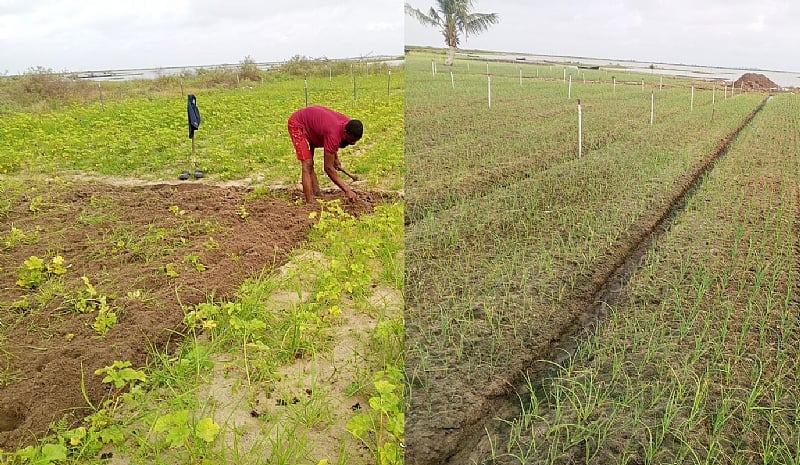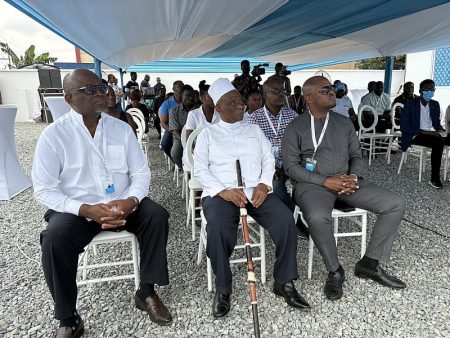The Anloga District of Ghana, a region traditionally known for its fertile farmlands, is facing an escalating ecological crisis: saltwater intrusion. Once vibrant fields are now blanketed in white, not from bountiful harvests, but from the devastating effects of salt. Recurring floods from the Keta Lagoon are inundating farmlands with saline water, rendering the soil infertile and crippling agricultural production. Farmers, who have relied on these lands for generations, are witnessing their livelihoods disappear beneath the encroaching saltwater. The crisis is not simply an environmental concern; it represents a profound threat to the food security and economic stability of the region. The plight of Anloga’s farmers underscores the urgent need for effective climate action and serves as a stark reminder of the tangible impacts of a warming planet.
The primary culprit behind this escalating salinity crisis is believed to be the silted Volta Estuary. The estuary, located in Ada, serves as the crucial connection between the Volta River and the sea. Farmers contend that the accumulation of silt and debris within the estuary has created a blockage, impeding the natural flow of water. This obstruction, they argue, forces the lagoon to overflow its banks, pushing saline water inland and onto their farmlands. The result is a devastating cycle of flooding and saltwater intrusion, leaving previously productive fields barren and unproductive. The farmers’ accounts paint a grim picture of a community struggling to adapt to a rapidly changing environment, their traditional farming practices rendered ineffective in the face of this ecological challenge.
The impact of saltwater intrusion on Anloga’s agricultural sector is devastating. Farmers like Mensah Maseinga of Tegbi recount the heartbreaking experience of watching their crops wither and die as saltwater inundates their fields. What were once reliable sources of sustenance and income are now barren patches of land, incapable of supporting life. The salinity crisis has not only diminished crop yields but has also forced farmers to abandon traditional crops in favor of more salt-tolerant varieties. Noel Kokoroko, another farmer in the region, has been forced to switch from cultivating tomatoes to onions, hoping the latter’s resilience to water will allow him to salvage some harvest amidst the challenging conditions. This shift highlights the difficult choices farmers are forced to make as they grapple with the changing environmental realities.
While saltwater intrusion is not a new phenomenon in coastal Ghana, the severity and frequency have intensified in recent years. This escalation is attributed to a combination of factors, including climate change, rising sea levels, and more intense rainfall patterns. The rising sea levels contribute to the higher baseline water levels in the lagoon, while the increased rainfall exacerbates the flooding, pushing larger volumes of saltwater further inland. These factors, combined with the obstructed estuary, create a perfect storm of conditions that are overwhelming the natural drainage systems and accelerating the degradation of the farmlands. The farmers of Anloga are witnessing the stark reality of climate change unfold before their eyes, transforming their once-productive lands into saline wastelands.
Local leaders and agricultural experts are calling for immediate intervention to address the crisis. They emphasize the urgency of dredging the Volta Estuary to remove the accumulated silt and restore the natural flow of water between the river and the sea. This, they believe, is a crucial step in mitigating the flooding and reducing the intrusion of saltwater onto the farmlands. Beyond dredging, they advocate for a comprehensive coastal management strategy that incorporates sustainable land use practices, improved drainage systems, and climate change adaptation measures. They recognize that this is not simply an agricultural issue but a multifaceted environmental challenge that requires a concerted and coordinated response.
As the world prepares for COP30, the farmers of Anloga are making their voices heard, appealing to the global community for support. For them, climate change is not a distant threat but a present reality that is destroying their livelihoods and threatening their future. Their story serves as a powerful testament to the urgent need for climate action. The plight of Anloga underscores the importance of global cooperation in addressing the challenges of climate change and the critical need for sustainable solutions that protect vulnerable communities and safeguard the planet’s future. Their plea for help resonates beyond the borders of Ghana, serving as a stark reminder of the interconnectedness of global ecosystems and the shared responsibility to protect them. The farmers of Anloga are not just fighting for their survival; they are fighting for the future of their community, and in a larger sense, for the future of the planet.














